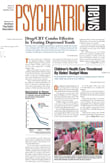Telepsychiatry—the practice of psychiatry at a distance via videoconferencing—is coming of age in the United States.
A number of clinical telepsychiatry programs burst upon the American scene during the 1990s (Psychiatric News, March 19). Telepsychiatry can be used reliably to assess people with symptoms of various mental and behavioral states (Psychiatric News, December 5, 2003). And now telepsychiatry appears to be effective for treating people with depression, a new study has found. It was headed by Paul Ruskin, M.D., of the Veterans Administration Maryland Health Care System in Baltimore and reported in the August American Journal of Psychiatry.
“To our knowledge, this study is the first to demonstrate that symptom improvement and remission of depression treated by means of telepsychiatry is similar to improvement with in-person treatment,” Ruskin and his colleagues wrote.
`Major Step Forward'
“This study is a major step forward in research on the efficacy of telepsychiatry,” Christopher Thomas, M.D., a professor of psychiatry at the University of Texas Medical Branch at Galveston and a psychiatrist who has had experience with telepsychiatry, told Psychiatric News.
In this study, 119 depressed veterans referred for outpatient treatment were randomly assigned to either treatment by means of telepsychiatry or in-person treatment. Eight psychiatrists provided treatment throughout the study, and each psychiatrist saw patients in both treatment conditions. Psychiatric treatment lasted six months and consisted of psychotropic medication, psychoeducation, and brief supportive counseling.
The treatment outcomes for patients in each group were compared. The depressive symptoms of patients in each group significantly improved over the treatment period, and improvement did not differ by treatment group. The two groups were found equally adherent on appointment adherence and medication adherence, and patient satisfaction was equally high in both groups.
With regard to cost, telepsychiatry was found to be more expensive per treatment session, but this difference vanished when the costs of psychiatrists' travel to remote clinics more than 22 miles away from the medical center were taken into consideration.
Thus, “treatment of depression by means of telepsychiatry and in-person treatment of depression have comparable outcomes and equivalent levels of patient adherence, patient satisfaction, and health care cost,” Ruskin and his colleagues concluded in their study report.
Psychiatrists Less Enthusiastic
On a somewhat less positive note, however, the psychiatrists who participated in the study reported significantly higher satisfaction with face-to-face encounters than with telepsychiatry sessions. Thomas found this finding intriguing and thinks it might be due, at least in part, to the psychiatrists' lack of experience with telepsychiatry. He said that he was concerned about whether he could use telepsychiatry to “connect with severely traumatized domestic violence victims, but was surprised to find that in some ways it may have facilitated establishing therapeutic rapport.”
Mitchel Kling, M.D., a staff clinician at the National Institute of Mental Health and one of the study authors, told Psychiatraic News that one implication of the study findings is that “remote treatment of depression by telepsychiatry can be carried out safely and effectively in most patients.”
“One caveat is that in our study, patients presented to a remote clinic where there were staff members trained in mental health care who could help the patients with the technology if they became acutely distressed. I don't think we can say yet that these findings are generalizable to allowing remote treatment of patients in their homes.”
The study was financed by the VA Office of Research and Development Health Services Research and Development Service, the VA Maryland Health Care System, and the VISN 5 Mental Illness Research, Education, and Clinical Center.
Am J psychiatry 2004 161 1471
